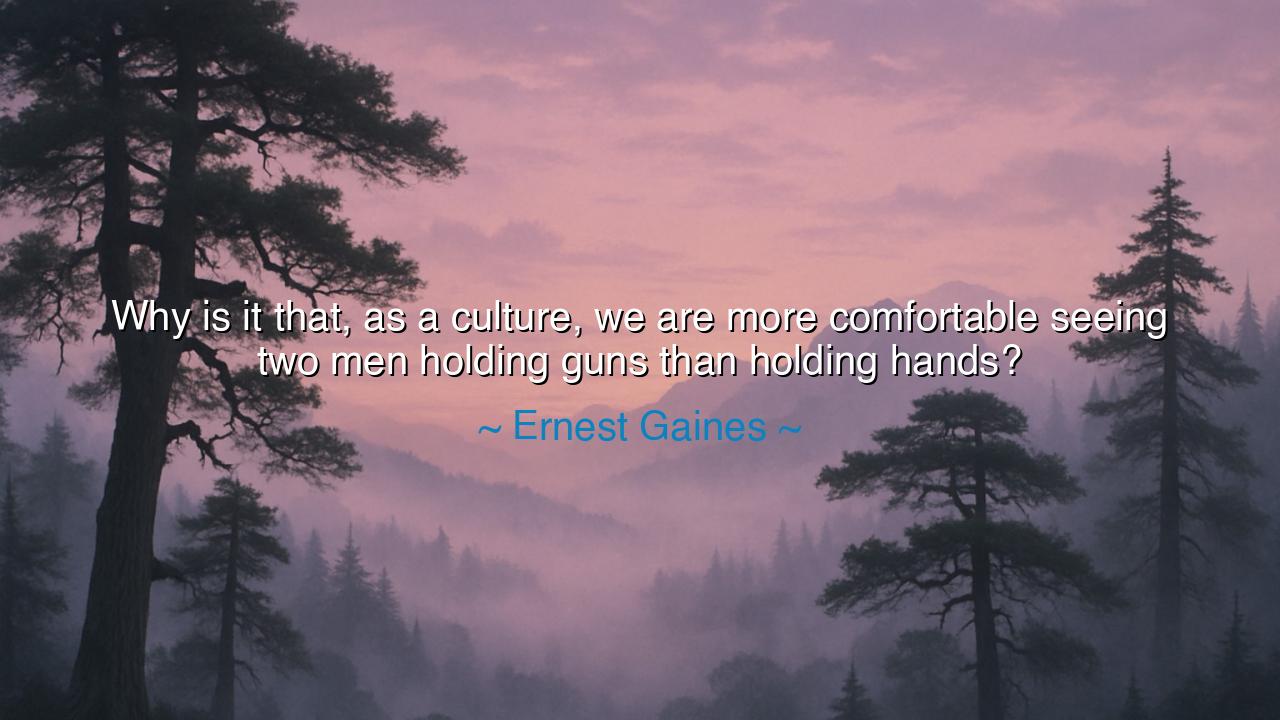
Why is it that, as a culture, we are more comfortable seeing two
Why is it that, as a culture, we are more comfortable seeing two men holding guns than holding hands?






Ernest Gaines, teller of hard truths and chronicler of the human soul, once asked with piercing clarity: “Why is it that, as a culture, we are more comfortable seeing two men holding guns than holding hands?” This question is no idle remark, but a mirror held to society, showing its deepest contradictions. For in it lies the exposure of a sickness: that we glorify violence while fearing tenderness, that we honor death-dealing power while shunning the simple gesture of love.
The meaning of the quote is sharp and unsettling. Gaines points to the way cultures, especially in the modern West, have shaped their values. Two men standing side by side, armed with guns, ready for war or bloodshed, are often celebrated as heroes, protectors, or even symbols of masculinity. Yet the same two men, if they were to stand hand in hand, offering comfort, compassion, or love, would provoke discomfort, suspicion, or even condemnation. Thus, Gaines asks why our eyes accept the sight of destruction more easily than the sight of tenderness.
The origin of this thought lies in the histories of violence and prejudice. For centuries, societies have built their foundations on conquest, on war, on domination. Strength has been equated with brutality, and weakness with vulnerability or love. To reinforce this, love between men—whether fraternal or romantic—was hidden, ridiculed, or punished, while their violence was exalted. The battlefield was a place of honor; the clasp of hands was seen as shame. Gaines, who lived through the harsh contradictions of America’s racial and cultural struggles, knew how deeply such distortions cut into the human spirit.
History itself provides many examples of this paradox. Consider the Great War of 1914. Photographs of young soldiers, barely men, show them with rifles in hand, marching proudly to their deaths. Such images were displayed as noble and heroic. Yet the same soldiers, in their trenches, often held one another for warmth, comfort, and survival. Those moments of humanity were hidden, unspoken, for fear that they might seem unmanly or improper. Society celebrated the guns, but erased the hands.
But the question is not only about war or violence—it is about fear. The sight of men holding hands threatens a culture’s rigid ideas of masculinity, of identity, of what it means to be strong. To hold a gun is to assert dominance; to hold a hand is to show connection. The first creates distance; the second destroys it. And therein lies the danger for a culture built upon walls and divisions: love bridges where hatred divides. Gaines calls us to see that our unease reveals more about our sickness than about the act itself.
O children of tomorrow, let this truth strike deep into your heart: do not be deceived by the false glories of violence. Do not measure manhood or strength by the weapons one bears. Instead, measure greatness by the courage to show compassion, to embrace, to love openly. For there is more bravery in holding a hand than in pulling a trigger, more power in tenderness than in cruelty.
Therefore, the lesson is this: if we wish to heal as a people, we must unlearn the comfort of violence and learn again the power of love. Celebrate the image of men holding hands, not as weakness, but as the highest proof of humanity. Teach children that kindness is strength, that empathy is courage, that peace is greater than war. Break the chains of false ideals, and build a new culture where the sight of love disarms us less than the sight of death.
Thus, Ernest Gaines’s words endure as a challenge. They call us to face the contradictions of our age and to ask: which shall we honor—guns or hands? Destruction or connection? If we choose rightly, then the generations yet unborn may walk in a world where love is no longer hidden, but raised high, brighter than any weapon, stronger than any fear.






AAdministratorAdministrator
Welcome, honored guests. Please leave a comment, we will respond soon